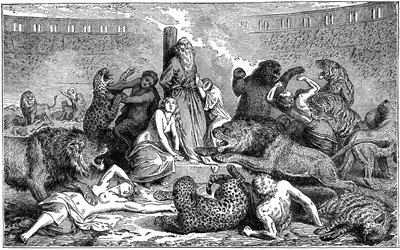(单词翻译:单击)

The world's most widely followed faith is gathering persecutors, even non-Christians should worry about that.
世界上最流行的宗教信仰正在各处受到压制,即使非基督徒也应对此关切。
CHRISTIANITY is growing almost as fast as humanity itself, but its 2.2 billion adherents cannot count on safety in numbers. That is partly because the locus of the world's largest religion is shifting to hotter (in several senses) parts of the world. According to a report published by the Pew Forum in December, the Christian share of the population of sub-Saharan Africa has soared over the past century, from 9% to 63%. Meanwhile, the think-tank says, the Christian proportion of Europeans and people in the Americas has dropped, respectively, from 95% to 76% and from 96% to 86%.
基督教徒的数量几乎和世界人口数量同步增长,但是,22亿信徒的众多数量并不能自然地保障他们的安全。部分原因是,这个世界上最大宗教的地域越益向世界更热的地方扩展(这里热字有多种含义)。据Pew论坛今年12月发表的一份报告,黑非洲(撒哈拉以南)的基督教人口占总人口的比例,在上个世纪中从9%猛增至63%。与此同时,欧洲和美国人口中基督徒的比例却分别从95%和96%降到76%和86%。
But moving from the jaded north to the dynamic south does not portend an easy future. In Nigeria scores of Christians have died in Islamist bomb attacks, targeting Christmas prayers. In Iran and Pakistan Christians are on death row, for "apostasy"—quitting Islam—or blasphemy. Dozens of churches in Indonesia have been attacked or shut. Two-thirds of Iraq's pre-war Christian population have fled. In Egypt and Syria, where secular despots gave Christianity a shield of sorts, political upheaval and Muslim zeal threaten ancient Christian groups. Not all Christianity's woes are down to Muslims. The faith faces harassment in formally communist China and Vietnam. In India Hindu nationalists want to penalise Christians who make converts. In the Holy Land local churches are caught between Israeli encroachment on their property and Islamist bids to monopolise Palestinian life. Followers of Jesus may yet become a rarity in his homeland.
但是,基督教从疲惫的北方向富有活力的南方扩展,并不能预示基督徒在南方的安宁生活。在尼日利亚,几十名基督徒在针对圣诞节祈祷者的伊斯兰炸弹袭击中死亡。在伊朗和巴基斯坦,基督徒因为变节(放弃原来的伊斯兰信仰)或亵渎罪被判死刑。在印尼,几十座教堂被袭击或关闭。在伊拉克,战前基督教人口的三分之二已逃离那里。在埃及和叙利亚,虽然世俗的独裁者多少给了基督徒一些保护,但政治动荡和穆斯林的狂热在威胁着那里历史悠久的基督教团体。此外,穆斯林并不是基督徒遭受磨难的唯一根源。基督教信仰在形式上的共产主义国家中国和越南也受到烦扰。在印度,印度教民族主义者要求惩罚那些变换信仰转为基督徒的人。在耶路撒冷圣地,当地的教堂受到两方面的夹击:以色列人对基督教财产的侵蚀和巴勒斯坦人独占耶路撒冷的要求。耶稣的家乡可能会罕见基督徒了。
Compared both with the wars of religion that once tore Christendom apart and with various modern intra-faith struggles, such as those within Islam, little blood is being spilt. But the brutality matters. Even if Western powers no longer see promoting Christianity's interests as a geopolitical priority, it is hard to imagine American evangelicals ignoring a full-scale clampdown on house churches in China. And whatever their own beliefs, Western voters have other reasons to worry about the fate of Christians. Regimes or societies that persecute Christians tend to oppress other minorities too. Sunni Muslims who demonise Christians loathe Shias. Once religion is involved, any conflict becomes harder to solve.
与历史上那些基督教徒之间的宗教战争和现代的宗教内部冲突(如伊斯兰)比较起来,目前对基督教的烦扰还不算太血腥,但仍然是残酷的。即便西方大国已不再把扩展基督教作为地缘政治的优先目标,仍然很难想象美国的传教士们会漠视中国对家庭教堂的全面禁止。不管他们自己的宗教信仰是什么,西方的选民们有其它原因对基督教徒的命运感到关切。因为,压制基督教的政权或社会通常也会压制其他少数人群。把基督徒视为魔鬼的逊尼派穆斯林同样诅咒什叶派穆斯林。只要宗教问题缠绕进来,任何冲突都变得难以化解。
Just don't call it a crusade
绝非十字军运动[注2]
Among liberal values, the freedom to profess any religion or none has a central place. America's government is bound by law to promote that liberty. In line with its own ideals, America is rightly as concerned by the persecution of Muslims of any stripe as by the travails of Christians in China or Jews and Bahais in Iran. And it objects when Christian lands, like Belarus, practise persecution. Other more secular Western countries should do more to defend that right.
在自由主义的价值观念中,信教或不信教的自由有着极为重要的地位。美国政府有促进宗教自由的法律义务。基于它自己的理念,美国理应对所有形式的宗教压制感到关切:不管是穆斯林受到的迫害,还是中国的基督教徒、伊朗的犹太教徒和巴黑伊教派经受的磨难,都是一样。当基督教占统治地位的国家(如白俄罗斯)发生压制其他宗教现象时,美国同样表示了反对。其它宗教色彩较淡的西方国家也应当在保护宗教自由上承担更多责任。
What about those who see persecuting other religions as part of their calling? No faith is blameless: from Delhi to Jerusalem many of those stirring up hatred are men of God. But there is a specific problem with Islam. Islamic law (though not the Koran) has often mandated death for people leaving the faith. There are signs of change. The 57-member Organisation of Islamic Co-operation has, with American encouragement, toned down its bid to outlaw "blasphemy" in various UN resolutions. It also condemned the attacks in Nigeria. But more Muslim leaders need to accept that changing creed is a legal right. On that one point, the West should not back down. Otherwise believers, whether Christian or not, remain in peril.
有些人把迫害其他宗教看做是自己的使命,这在各个宗教里都不少见:从德里到耶路撒冷,很多煽动宗教仇恨的人自称为神意的执行者。但伊斯兰的问题更大一些。依照伊斯兰法(不是可兰经),对于改变信仰的人通常必须执行死刑。不过,现在已经有改变的迹象。有57个成员国的伊斯兰合作组织,已不再要求把一些联合国决议中的词句视为亵渎伊斯兰和非法,这个态度得到了美国的鼓励。这个组织还谴责了尼日利亚发生的袭击基督教徒的事件。但是,更多的穆斯林领导人需要承认人们改变信仰的权利。在这一点上,西方不应退缩。不然的话,宗教信徒们(不管是不是基督教徒)仍然难以摆脱困境。
[注1]在基督教早期受到的迫害中,曾有古罗马把基督徒喂给狮子的酷刑。
[注2]这里是说反对迫害基督徒并不是像十字军东征那样站在基督教立场上反对异教,而是要反对一切形式的宗教压制。


